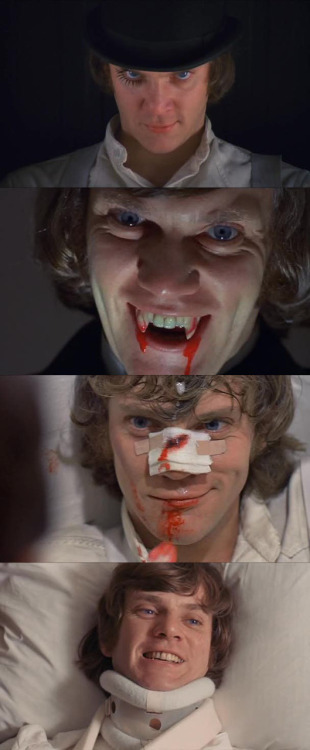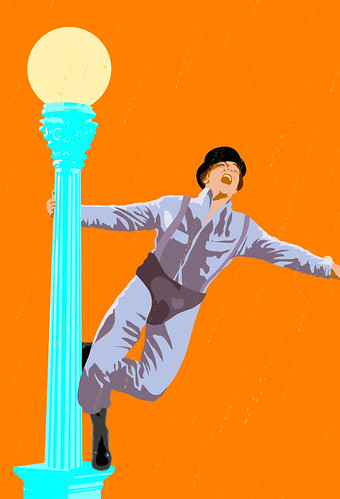 |
| While this isn't my copy, this is the printing I read. 1963 United States printing, with the full Nadsat glossary in the back, and entirely devoid of the last chapter. |
I'll start with this.
I believe the film stands just perfectly on its own two feet. It's one brilliant man's interpretation of another brilliant man's work. It's not the be all and end all, but it works. It's good. The feel and aesthetic fit the plotline quite nicely, and without a doubt the directing is beyond measure. Malcolm McDowell, while a good ten years too old for the part, is electric, and perfect for the part in every other way.
Here is a case in which I feel the film deviates from the book aesthetically but for the better. Cinematically this is much stronger than a 15 year old boy laying on his bed listening to records. While the dialogue from the novel is almost entirely intact, the situation differs just enough for it to be more than the novel intended. As is the case in Kubrick films, it's rife with symbolism. Each frame is a photo and each photo means something.
I do so love that Kubrick and Burgess' screenplay maintained the position for Alex as "Your Humble Narrator". He is made to tell you every bit of the story. Nothing is handed to you. Which... to be honest... creeps me out. It's disconcerting to have someone force-feeding you their version of a story.
The choice is taken away.
Music is wildly important in this film, as it is in the book. It's clear in the previous clip. However - in a brilliant Ludovico-style twist, I can't listen to this without thinking of this. The choice isn't mine, but I think of utter nastiness if I pause and reflect on the music. That's not to say I can't enjoy Singing in the Rain, it's a wonderful film, but the song raises my hackles just a little bit, until of course I realize why and push that from my mind.
I joke around with people close to me about the ringtone on my phone for the same reason. It's part of the fourth movement of Beethoven's Ninth Symphony. You know, this part. So when my phone rings... what's my first thought? Nazis. Of course. Not by choice.
Of course there's this, straight out of the book and perfectly acted. There were choices made, clearly, by Burgess and Kubrick alike, to maintain the tension of the novel as best as they could. This is one of my favorite examples. This is another. Several details are amiss here- the woman herself, her call to the police, her home, her "vesches", but the tension is through the roof, and as always the Kubrick cinematography is incomparable (and also makes me a little bit sick. Clever, eh?)
Another scene, here, doesn't work as well in the film (to me) as it does in the book. The book makes Mr. Alexander far more unaware of who Alex really is, and Alex is the only one completely aware of the situation. I think this interpretation flips the tension of the scene, and somehow weakens it. I'd love other opinions, so send them along.
All in all I find the film to be a perfect story arc, vastly disconcerting and disturbing, and fascinating to look at. Yes, the "heighth of fashion" is different. Yes, he's too old. Yes, the setting is a bit more dated than this futuristic (er... the mid nineties, according to Burgess) Orwellian society deserves. But it's all there. Everything cinematically needed to make this piece really horrorshow.
Now we get into the real grahzny gritty stuff, brothers, as I'm bringing the book back into the picture.
I'm a good reader. A fast one. But it took me 3 months to read this book. Much like reading Mark Twain, even though I know and understand the language, it's difficult to read a language differing from the one you speak in your day to day life. Burgess was a linguist, and did a brilliant job of combining Russian with British slang to make the "nadsat" language. Of course, this is an incredible tool. It throws you off balance right from the off, but as you settle into the story it becomes nearly natural... until Alex gets excited and he's throwing so many "slovos" at you that you're flipping to the glossary every third word (or that's what happened to me). When Alex returns to his parents' home, in part three of the novel, his speech is overtaken by the nadsat like we haven't heard for several chapters. To me this represents two things:
- a return to home
- high anxiety
There are theories floating around on the internet (and I'm sure they've been around as long as the book has) that Alex is a psychopath. I think the entire point of the novel is that he isn't. It's clear that while Our Humble has a impulse control problem, he is not free from self control, as he mentions several times throughout the novel (both before and after treatment) choosing to put thoughts from his mind, and to wait to act on his violent impulses. He obviously uses sex and violence to mollify his personal needs, but just as often as not he's burying guilt or anguish, two things a psychopath doesn't feel. He's aware of the ramifications of his actions.
This, oh brothers, is where the final and oft-disputed final chapter comes in.
You can read it here.
I'll wait.
*twiddles thumbs* *whistles a bit of the old Ludwig Van*
You done? Cool.
Okay SO. That chapter obviously takes psychopathy out of the picture, that goes without saying. It strongly enforces the point that it's our choices that shape us. Obviously, the biggest point is "people change".
But...
Maybe I don't like that. I feel like it throws the entire story arc out the window. So he was just going to come to it of his own accord anyway? He was going to figure himself out? The treatment and rehabilitation mean absolutely nothing. So he grew up. Fabulous. Now what? As a movie goer, and sinny freak, I think the film did just fine as is, thank you very much, and I'm glad Kubrick never read this chapter to begin with.
Psychologically, and from a writer's point of view I love this chapter. It brings it all back to where it started. And it proves the point- he ISN'T made to be a clockwork orange. He makes a choice to change and "cure" himself. As a political/societal satire piece, it needs this chapter. It needs to prove the point that you can't change people just because you want to. The government didn't help him. The judicial system didn't help him. The Minister of the Interior or Inferior didn't help him. He was left to his own devices, and chose to become (theoretically) just what they wanted. An upstanding member of society, with a child and a job and a family.
But... his family. He's already anticipating and projecting an identity onto "his son"
"But then I knew he would not understand or would not want to understand at all and would do all the veshches I had done, yes perhaps even killing some poor starry forella surrounded with mewing kots and koshkas, and I would not be able to really stop him."
This is, I suppose, a very mature thought. But at the same time... why not let it stop with him? Why does he think he can't shape a child to know better?
Because it's not about him.
It's about society.
I
t's the way he was forced to behave, through necessity, to keep his head above water.
In the end... it's not his choice.
We're all made to be clockwork oranges.


The way I understand it, the screenwriter left out the last chapter BECAUSE it showed Alex maturing. All the histories that I have read state that Burgess despised the movie because of this.
ReplyDeleteI agree with you that the book and the movie, while basically the same story, stand apart and are both excellent.
lovely. definitely agree. Love the last chapter. love your interpretation.
ReplyDeleteI - Kubrick was the screenwriter. And from what I read in my research before I wrote this... he had literally not read it.
ReplyDeleteHere is a fabulous interview with Kubrick -
http://www.visual-memory.co.uk/amk/doc/interview.aco.html